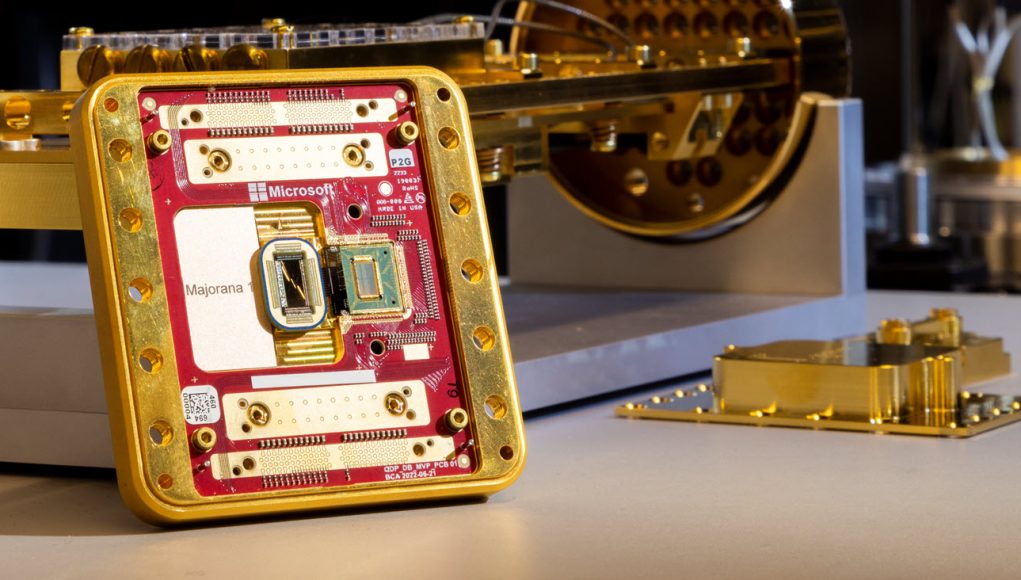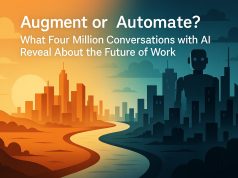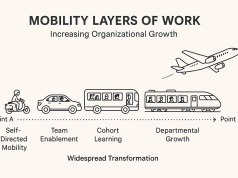Throughout history, every technological leap has been met with both excitement and fear. The steam engine liberated muscle labor, the internet reshaped communication, and AI is now redefining cognitive work. But just as we began to understand AI’s impact on jobs, along comes quantum computing—a force so disruptive that it doesn’t just change the game, it changes the rules of reality itself.
Microsoft’s announcement of Majorana 1—the world’s first topological quantum processing unit (QPU)—is not just another milestone in quantum computing. It is a fundamental shift that forces us to rethink what work means, how AI evolves, and what it means to be productive.
This essay explores how quantum computing alters our very understanding of work, the acceleration of AI, and the new societal structures we must prepare for.
I. The Limits of AI and Why Quantum Computing Breaks Them
Artificial intelligence has already reshaped modern work. AI models write reports, diagnose diseases, optimize logistics, and even make investment decisions. But for all their power, today’s AI systems are brute-force calculators, relying on massive amounts of computationally expensive trial and error to learn. The limitations of this approach are becoming clear:
- Scaling Costs Are Unsustainable
- Complexity Beyond Comprehension
- Simulation Bottlenecks
How Quantum Computing Fixes These Problems
Quantum computers don’t just make AI faster—they change what AI is capable of doing:
🔹 Quantum AI Learns in Hours, Not Weeks
- With exponentially greater processing power, quantum computers can train AI models in hours or even minutes.
- AI systems that take weeks to optimize using classical computers could be designed, trained, and deployed in real time.
🔹 AI Gains True Reasoning Power
- Today’s AI approximates intelligence through neural networks; quantum AI would natively understand complex entangled systems.
- Instead of just recognizing speech, quantum AI could comprehend meaning, nuance, and ambiguity at an unprecedented scale.
🔹 Simulating the Future Becomes Possible
- AI powered by quantum computing could model entire economies, ecosystems, and social structures before decisions are made.
- Businesses and governments could run real-time simulations of global events, making AI a strategic decision-making tool rather than just an analytical assistant.
II. The Quantum Leap in AI: Thinking Beyond Patterns
1. The Limits of Classical AI
Artificial Intelligence today is built on classical computing. Even the most advanced neural networks, like those powering ChatGPT, rely on brute-force number crunching. AI is still just very sophisticated pattern recognition, no matter how human-like it seems.
The biggest challenges AI faces today include:
- Scalability: Training large AI models takes months.
- Generalization: AI cannot reason outside its training data.
- Energy Consumption: Data centers running AI consume vast amounts of power.
Quantum computing shatters these limits. Instead of processing one possibility at a time, quantum computers can explore many possibilities simultaneously—enabling AI to think in a way closer to human intuition than ever before.
2. Quantum AI: A Different Kind of Intelligence
What happens when quantum computing meets AI?
- Training AI in minutes, not months → AI models that take weeks to train on classical supercomputers could be trained in real time using quantum processors.
- True creativity and reasoning → Today’s AI guesses the next best word in a sentence. Quantum AI could simulate entire scenarios, enabling it to reason through complex decisions.
- AI-powered scientific discovery → Instead of relying on trial and error, AI could predict the laws of physics, model entire ecosystems, and design new materials in ways we’ve never seen before.
In short, Quantum AI is not just faster AI—it is qualitatively more powerful.
III. The Redefinition of Work: Intelligence as a Utility
If steam engines replaced muscle labor and AI is augmenting cognitive labor, what happens when intelligence itself becomes an abundant resource?
1. The Death of Repetitive Work
Many fear that AI will replace jobs. But the real transformation is that AI, powered by quantum computing, will make certain kinds of work obsolete—not by replacing workers, but by eliminating the need for specific tasks entirely.
- Financial modeling → AI can already predict market trends, but with quantum computing, it will simulate entire economies, making traditional investment analysis unnecessary.
- Scientific research → What takes years in laboratories today—like drug discovery—could be reduced to a quantum simulation lasting mere hours.
- Legal contracts and negotiation → AI could evaluate legal complexities and draft perfect contracts instantly, reducing legal costs.
The result? Jobs will shift from repetitive execution to complex problem-solving, ethical oversight, and creative innovation.
2. The Rise of the Quantum-Augmented Worker
Rather than eliminating jobs, quantum-powered AI will redefine skill sets:
- From Engineers to Architects → Instead of coding software, workers will design problems for AI to solve, requiring high-level conceptual thinking.
- From Analysts to Strategists → Workers won’t crunch numbers; AI will do that. Instead, humans will focus on interpreting AI insights and making critical decisions.
- From Specialists to Multi-Domain Experts → Quantum computing enables AI to cross disciplines, meaning workers must understand how to leverage AI across fields, from medicine to finance to energy.
AI today is a tool. AI tomorrow will be a co-worker, a collaborator, and possibly even a leader in decision-making.
IV. The New Social Contract: Preparing for a Post-Scarcity Economy
If quantum computing accelerates AI’s ability to solve problems, automate discovery, and optimize economies, then we are entering a world where scarcity—of knowledge, labor, and even capital—begins to erode.
1. The Role of Governments and Institutions
Governments will face massive policy decisions in the next decade: ✅ How do we educate workers for a world where AI performs 80% of today’s knowledge work? ✅ Should universal basic income (UBI) be introduced as quantum automation removes traditional jobs? ✅ How do we ensure AI and quantum computing benefit everyone, not just corporations with access to quantum power?
This is not science fiction. Quantum AI could predict economic collapses, simulate global pandemics, and optimize entire societies. But if left unchecked, it could also concentrate power in the hands of those who own the quantum networks.
2. The Ethics of Superintelligence
With quantum-enhanced AI:
- Who decides what AI should be allowed to solve?
- If AI can outperform humans in creativity, does human innovation still matter?
- If quantum AI makes all major decisions, do governments still govern?
We are not just building smarter machines; we are building new decision-making entities that will redefine power structures.
V. The Road Ahead: Embracing the Inevitable
Microsoft’s Majorana 1 is just the beginning. If history has taught us anything, it’s that we can resist change, or we can shape it.
This is not about fearing AI or quantum computing—it’s about understanding its impact and preparing for what comes next:
- Workers must become lifelong learners, constantly adapting to a world where skills change faster than ever.
- Businesses must rethink productivity, not in terms of hours worked but in problems solved.
- Governments must move beyond outdated economic models, preparing for a world where intelligence itself is abundant.
The future of work is no longer just about automation. It is about a complete redefinition of intelligence, labor, and purpose.
We stand at the threshold of the greatest transformation in human history. The only question is: Will we shape the change, or will the change shape us?




























